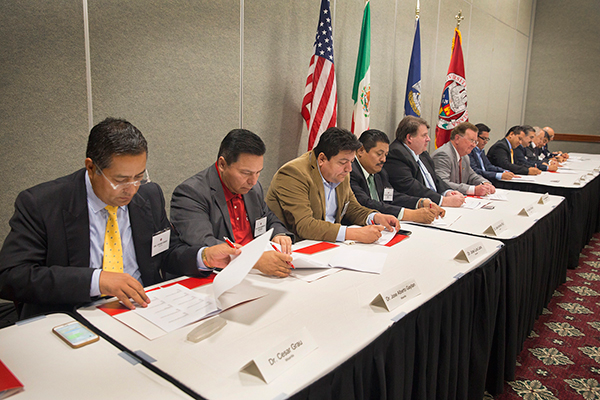Fifteen presidents of Mexican universities signed an agreement with the University of Louisiana at Lafayette Thursday that will promote academic and research collaborations.
Three more Mexican universities will sign the same agreement soon.
“It will be a very beneficial partnership for both countries,” said Dr. Joseph Savoie, UL Lafayette president.
As a result of this agreement, more Mexican students will have the opportunity to study at UL Lafayette.
At first, emphasis will be placed on faculty members at the 18 universities who are seeking higher degrees. About 30 percent of their faculty members have terminal degrees.
“These universities have programs to send their faculty to U.S. institutions to get their Ph.D.s – fully funded. They want to increase that number substantially,” Savoie said.
The 18 higher education institutions are in the states of Veracruz, Tabasco and Campeche. There are many similarities between those three states and Acadiana, he noted. For example, the Mexican states represent 90 percent of all oil and gas in Mexico. Also, 50 percent of all freshwater in Mexico flows through them.
Mutual challenges include coastal erosion, the ecological effects of pollution, saltwater intrusion, and the need for an educated workforce and improved infrastructure.
UL Lafayette and the Higher Technological Institute of Centla, which is in the state of Tabasco, signed a similar agreement in 2015.
The partnership began with Dr. Mark Zappi, dean of UL Lafayette’s College of Engineering. Dr. Ramesh Kolluru, UL Lafayette’s vice president of Research, Innovation and Economic Development, said the latest agreement “will expand the partnership substantially to include all academic areas and research.” The Mexican universities are interested in business, sciences, big data, and education, for example.
“They also want to have an understanding of what we do at UL Lafayette in terms of preserving our culture and our way of life, which is also important to them,” Kolluru said.
The partnership with UL Lafayette is expected to start with a small number of students and then grow. “The Mexican universities’ appetite for doing this is extraordinary,” he said.
“We have already had two of their faculty members come here this summer to scope out our labs, to meet with the faculty, and to get a head start. They’ve already found their major professors should they be fortunate enough to be selected to enroll here.”
There are provisions for student exchanges at the undergraduate and and graduate level.
“So, we can have students from Mexico come here and work within our research laboratories while touring industry in the region and our students can do the same. There’s also a provision for joint research activities so their students and faculty can come in and use our labs and work with our researchers and we do the same,” Kolluru said.
Several of the Mexican universities are research-grade institutions with international collaborations. Some of them have relationships with U.S. universities, including Harvard and Stanford.
Dr. José Manuel Piña Gutiérrez, rector of the Juárez Autonomous University of Tabasco, said the agreement is important for his university, a public institution that, with 55,000 students, is expected to educate a large portion of Mexico’s oil and gas industry workers.
“It’s crucial to share knowledge to develop resources between us, because, in the state of Tabasco alone, there are 5,000 wells,” he said.
In addition to the 15 presidents of Mexican universities, the mayor of Villahermosa, the largest city in the three-state region; the energy secretary from Tabasco; the undersecretary of education from Tabasco and several other government leaders traveled to UL Lafayette for a formal signing ceremony for the agreement.
Ricardo Fitz Mendoza, secretary of Energy, Natural Resources, and Environmental Protection for the state of Tabasco, said the agreement will help Mexico meet workforce shortages.
“The demand is for 130,000 people in the oil industry. This union with the University of Louisiana is needed in order to produce capable workers,” Mendoza said.
Emilio Monteverde, undersecretary for higher education for the state of Tabasco, said: “It’s important to establish alliances with institutions such as UL in areas for us that are fundamental: petroleum and gas, the environment, faculty training, and research in general. It will help us find strategies pertinent to needs from the energy (sector).”
“We are convinced that UL has the components that guarantee those objectives will take place,” Monteverde added.
